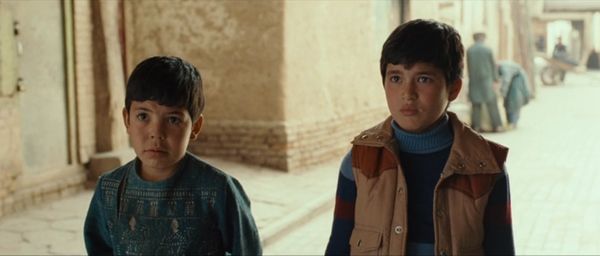Eye For Film >> Movies >> The Kite Runner (2007) Film Review
The Kite Runner
Reviewed by: Andrew Robertson

The Kite Runner, the story of an exile's return to Afghanistan to repay a debt of honour, is an adaptation of a novel, but also seems aimed fully at the Academy in hopes of an Oscar. To that end, it's hawkish, mawkish, and has a stirring score.
It's directed by Marc Foster - who helmed the grossly superior Stranger Than Fiction and Monster's Ball - and adapted from Khaled Hosseini's novel by David Benioff - who wrote and adapted 25th Hour, but also bears some responsibility for Troy. Doubtless, some of the problems of The Kite Runner can be laid at the feet of its source novel, but that which is strong on the page is often weak on the screen.

It's fair to call this magical realism, though not to the same extent as Seachd: The Inaccessible Pinnacle. The kite runner is Hassan (well played by Ahmad Khan Mahmidzada), a young Hazari boy, servant and friend to Amir (played by Zekeria Ebrahimi). The pair, as with most Afghan youths, are infatuated with American movies, American cars, and kite fighting - a sport in which kites with specially treated strings are used, the aim being to cut the string of the opposition. Hassan's titular talent is to run the kites, determining where the losing kite will land once its string has been cut.
It is this talent that leads him into danger, and eventually causes Amir to return, his "chance to be good again". The depiction of Kabul in the 1970s feels real, and the young, if inexperienced cast are convincing. The chaos of the Soviet Invasion has been handled well, and its aftermath, the transplanted Afghan community in California, is convincingly portrayed. The formalities of an Afghan courtship played out in suburban Los Angeles are touching, just the right side of surrealism.
As Amir's father, Homayoun Ershadi is convincing both before and after invasion. His toast to his son's graduation "Fuck the Russia" is the film's single use of strong language. Khalid Abdalla has a difficult task as Amir, but manages it well. The cast are probably the film's strongest asset.
Amir's return to Afghanistan is the film's weakest section. There's no denying the Taliban are and were horrible people, but here they are grotesque, even to the point of comedy. The stoning of adulterers at half-time in a football match is horrifying, enough in and of itself to stretch the film's 12A rating. The sequences that follow, with Amir's confrontation of a childhood nemesis, now a Taliban commander, child trafficker and abuser, push it even further. The villain, played by Abdul Salam Yusoufzai also dresses in white and wears gold-rimmed aviator glasses.
Beyond this, though, The Kite Runner is weak. Few shots are more than 30 seconds in length. At times it almost feels as if every paragraph of the novel has been given its own camera angle. In places it feels laboured, and its heavy-handedness overwhelms the few delicate moments. Then there is the business of its rating. Given that the violence and the language are important to the story and in character, the key moment of the plot, a sexual assault upon young Hassan, is still likely to be depressing, and makes the 12A a surprise. While ultimately redemptive of Amir, The Kite Runner raises questions that parents may find hard to answer.
Whatever the quality of the source novel, and no matter how faithful an adaptation this is, The Kite Runner does not impress as a film.
Reviewed on: 21 Dec 2007

















